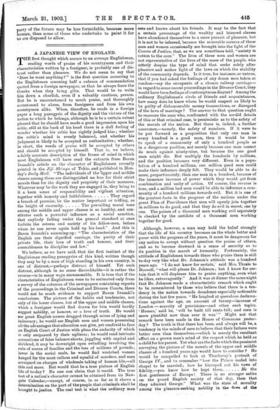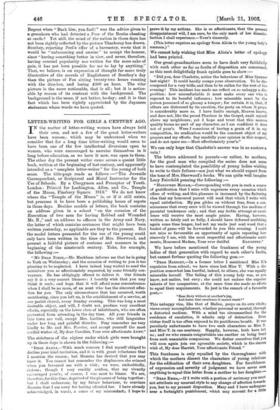A JAPANESE VIEW OF ENGLAND.
nr1HE first thought which occurs to an average Englishman, 1 reading words of praise of his countrymen and their characteristics written by a foreigner, is probably one of dis- trust rather than pleasure. We do not mean to say .that "Does he want anything P " is the first question occurring to the Englishman scanning half a column of commendation quoted from a foreign newspaper, or that he always fears the Greeks when they bring gifts. That would be to write him down a churlish, even if a valuably cautious, person. But he is unaccustomed to much praise, and thoroughly accustomed to abuse, from foreigners and from his own countrymen alike. When, therefore, he reads in a foreign paper a long panegyric of the dignity and the virtues of the nation to which he belongs, although he is to a certain extent pleased that he should have made a good impression upon his critic, still at the back of his head there is a dull feeling of wonder whether his critic has rightly judged him ; whether the critic's mind is evenly balanced, and whether his judgment is likely to be accepted as authoritative ; whether, in short, the words of praise will be accepted by others and should be accepted by himself. That is; we belieie, a fairly accurate description of the frame of mind in which most Englishmen will have read the extracts from Baron Iwasaki's article on the character of Englishmen recently printed in the Tzji Shimpo of Tokio, and published in Mon- day's Daily Mail. "The individuals of the slipper and middle classes among them are distinguished no less for their strict morals than for the dignity and propriety of their manners. Whatever may be the work they are engaged in, they bring to it a keen sense of responsibility and vigilant attention,
together with honesty and faithfulness They regard a breach of promise, be the, matter important or trifling, as the height of enormity The prevailing moral tone among the middle and upper classes is so healthy, and con- stitutes such a powerful influence -as a social sanction, that anybody falling under the general standard at once forfeits the esteem and society of his fellow-men, before whom be can never again hold up his head." And this is Baron Iwasaki's summing-up: "The characteristics of the English are their dignified carriage, the purity of their private life, their love of truth and honour, and their amenableness to discipline and law."
We believe, as we have said, that the first instinct of the Englishman reading panegyrics of this kind, written though they may be by a man of high standing in his own country, is one of distrust,—perhaps distrust - of himself. Yet such distrust, although in no sense discreditable—it is rather the reverse—is in many ways unreasonable. It is true that if the characteristics of Englishmen were to be estimated only from a survey of the columns of the newspapers containing reports
of the proceedings in the Criminal and Divorce Courts, there would not be much evidence to support Baron Iwasaki's conclusions. The picture of the habits and tendencies, not only of the lower classes, but of the upper and middle classes, which a foreigner would find drawn for him would hardly suggest nobility, or honour, or a love of truth. , He would see great English names dragged through mires of lying and indecency; he would see English men and women possessing all the advantages that education can give, yet unafraid to face an English Court of Justice with pleas the audacity of which is only surpassed by their ugliness; he would read intricate accusations of false balance-sheets, juggling with capital and dividend, it may be downright open swindling involving. the ruin of scores of families and the loss of millions of pounds; lower in the social scale, he would find wretched women banged for the most callous and squalid of murders, and men arraigned on charges of wholesale taking of human life,—all this and more. But would that be a true picture of English life of to-day ? No one can claim that it would. The true test of a nation's character cannot be obtained from its New- gate Calendar,—except, of course, in so fax as it shows a determination on the part of the neople that criminals shall be brought to justice. The real test is what the ordinary .man
sees and knows about his -friends. It may be the fact that a certain percentage of the wealthy and leisured classes have abandoned themselves to a mere pursuit of pleasure, but it is not to be inferred, because the miserable careers of the men and women occasionally are brought into the light of the Courts of Justice, that, as we are sometimes told, "society is rotten to the core." The lives of these men and women are not representative of the lives of the mass of the people, who utterly despise the type of mind that seeks solely after pleasure and makes light of the laws on which the stability of the community depends. Is it true, for instance, or untrue, that if you had asked the feelings of any dozen men taken at random—say the occupants of a chance railway carriage-a- in regard to some recent proceedings in the Divorce Court, they would have been feelings of contemptuous disgust? Among the ordinary Englishman's circle of friends and acquaintances, how many does he know whom be would suspect as likely to be guilty of dishonourable money transactions, or disregard of the laws of marriage ? The answer to that question ought to reassure the man-who, confronted with the sordid details of this or that criminal case, is pessimistic as to the safety of the morals of the nation. But there is, indeed, a further assurance,—namely, the safety of numbers. If it were to be put forward as a proposition that only one man in every hundred is a good man, then it would be true to speak of a community of only a hundred people as in a dangerous position, not merely because oue man cannot do much against ninety-nine, but because the one good man might die. But multiply the hundreds by millions, and the position becomes very different. Even in a popu- lation of a hundred millions, one million good men could make their influence deeply felt. They would be able to do more, proportionately, than one man in a hundred, because of the immense increase of power which they would get froth combination and unity of action. Of course, the reverse is true, and a million bad men would be able to influence a com- munity of a hundred millions towards evil. But it is one of the greatest facts in the progress of the nations under the great Plan of Providence that men will openly join together in millions to do good, and that they do evil in secret; one by one. The poison of a thousand men working evil separately is checked by the antidote of a thousand men working together for good.
Although, however, a man may hold the belief strongly that the life of his country becomes on the whole better and purer with the progress of the years, it must be dangerous for any nation to accept without question the praise of others, and so to become drowned in a sense of security as to its position in the march of humanity. Fortunately, the attitude of Englishmen towards those who raise them is still to-day very like what Dr.- Johnson's attitude was a hundred years ago. "I do not know for certain, said Mrs. Thrale to Boswell, "what will please Dr. Johnson ; but I know for cer- tain that it will displease him to praise anything, even what he likes, extravagantly." And it was at dinner the same night that Dr. Johnson made a characteristic remark which ought to be remembered by those who believe that there is a ten- dency in the nation towards decadence especially noticeable during the last few years. " He laughed at querulous declama- tions against the age, on account of luxury—increase of London — scarcity of provisions—and other such topics. Houses,' said he, will be built till rents fall ; and corn is more plentiful now than ever it was.' " Might not that remark have been made in the House of Commons yester- day?. The truth is that there has been, and always will be, a tendency in the minds of men to believe that their fathers were better men than themselves,—which is merely the resultant effect on a grown man's mind of the respect which he held as a child for his parent. Yet what are the facts which the pessimist surveying the picture of the morals of the upper and middle classes of a hundred years ago would have to consider P He would be compelled to look at Thackeray's portrait of George IV., and to remember "how the Prince reeled into chapel to be married ; how he hiccuped out his vows of fidelity,—you know how he kept them He the first gentleman of Europe ! There is no stronger satire on the proud English society of that day, than that they admired George." What was the state of morality among the pleasure-seeking nobility in the ante of the Regent when " Back him, you fool ! " was the advice given to a greenhorn who had detected a Peer of the Realm cheating at cards ? Yet still, the mind of the nation in those days has not been rightly reflected by the picture Thackeray has drawn. Southey, rejecting Peel's offer of a baronetcy, wrote that it would be " unbecoming and unwise " to accept the honour, since "having something better in view, and never, therefore, having courted popularity nor written for the mere sake of gain, it has not been possible for me to lay by anything." That, we believe, is an expression of thought far more truly illustrative of the morals of Englishmen of Southey's day than the picture of Fox sitting twenty-two hours running with the dice-box, and losing £500 an hour. The viler picture is the more noticeable, that is all ; but it is notice- able by reason of its contrast with the background. The background is the same, if not better, to-day; and it is that fact which has been rightly appreciated by the Japanese statesman whose words we have quoted.











































 Previous page
Previous page